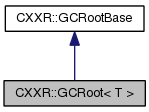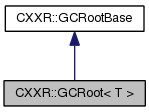Smart pointer to protect a GCNode from garbage collection. More...
#include <GCRoot.h>


Public Member Functions | |
| GCRoot (T *node=0) | |
| GCRoot (const GCRoot &source) | |
| Copy constructor. | |
| GCRoot & | operator= (const GCRoot &source) |
| GCRoot & | operator= (T *node) |
| T * | operator-> () const |
| Access member via encapsulated pointer. | |
| T & | operator* () const |
| Dereference the encapsulated pointer. | |
| operator T * () const | |
| Implicit conversion to encapsulated pointer type. | |
| T * | get () const |
| Access the encapsulated pointer. | |
Additional Inherited Members | |
 Static Public Member Functions inherited from CXXR::GCRootBase Static Public Member Functions inherited from CXXR::GCRootBase | |
| static void | visitRoots (GCNode::const_visitor *v) |
| Conduct a const visitor to all 'root' GCNode objects. | |
 Protected Member Functions inherited from CXXR::GCRootBase Protected Member Functions inherited from CXXR::GCRootBase | |
| GCRootBase (const GCNode *node) | |
| Primary constructor. | |
| GCRootBase (const GCRootBase &source) | |
| Copy constructor. | |
| GCRootBase & | operator= (const GCRootBase &source) |
| void | redirect (const GCNode *node) |
| Change the node protected by this GCRootBase. | |
| const GCNode * | ptr () const |
| Access the encapsulated pointer. | |
Detailed Description
template<class T = RObject>
class CXXR::GCRoot< T >
Smart pointer to protect a GCNode from garbage collection.
This class encapsulates a pointer to an object of a type derived from GCNode. For as long as the GCRoot object exists, the GCNode that it points to will not be garbage collected.
This class performs a similar function to GCStackRoot, but is intended for variables that are not allocated on the stack. Unlike GCStackRoot objects, there is no requirement that GCRoot objects be destroyed in the reverse order of their creation; the price of this is that there is a slightly greater time overhead to construction and destruction.
It is not recommended to declare a GCRoot (or indeed any object requiring non-trivial construction) at file or namespace scope in circumstances where the order of initialisation of data in different source files may be an issue. See the way in which Environment::s_base is declared and initialised in Environment.cpp for a preferable approach.
Constructor & Destructor Documentation
|
inlineexplicit |
- Parameters:
-
node Pointer the node to be pointed to, and protected from the garbage collector, or a null pointer.
|
inline |
Member Function Documentation
|
inline |
Access the encapsulated pointer.
- Returns:
- the pointer currently encapsulated by the node.
|
inline |
Implicit conversion to encapsulated pointer type.
- Returns:
- the pointer currently encapsulated by the node. The pointer is of type T* const to prevent its use as an lvalue, the effect of which would probably not be what the programmer wanted.
|
inline |
Dereference the encapsulated pointer.
- Returns:
- a reference to the object pointed to by the encapsulated pointer. The effect is undefined if this object encapsulates a null pointer.
|
inline |
Access member via encapsulated pointer.
- Returns:
- the pointer currently encapsulated by the node.
|
inline |
|
inline |
The documentation for this class was generated from the following file:
 1.8.1
1.8.1